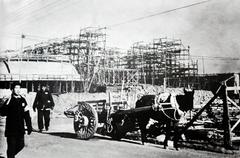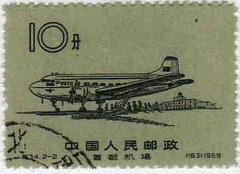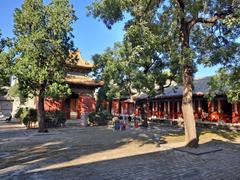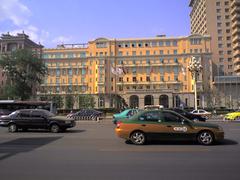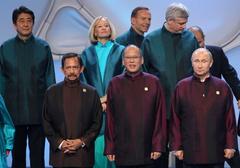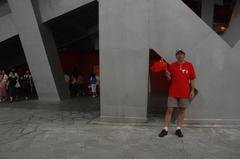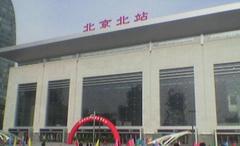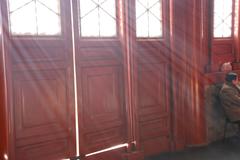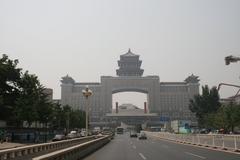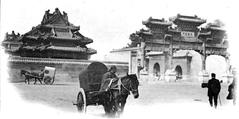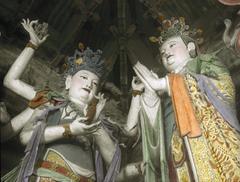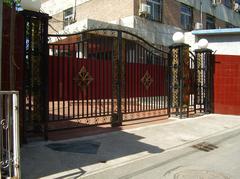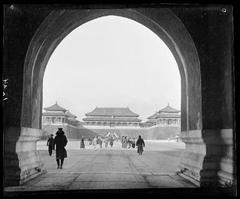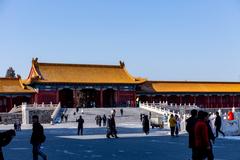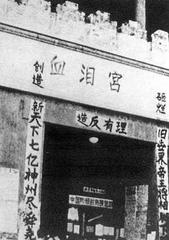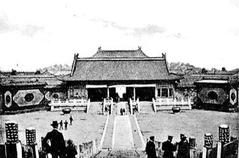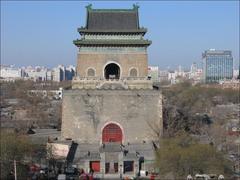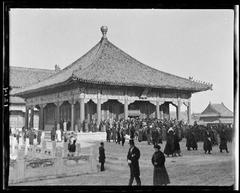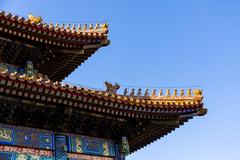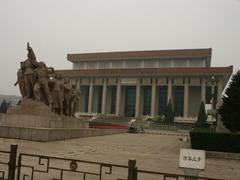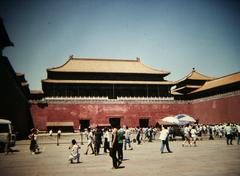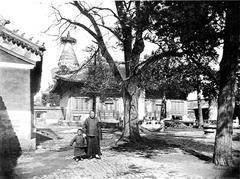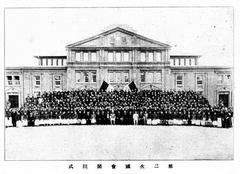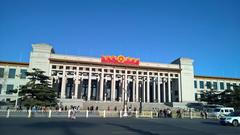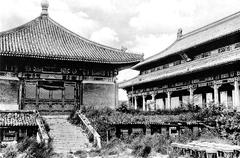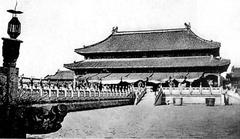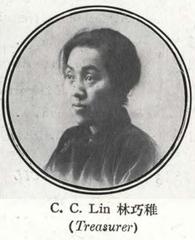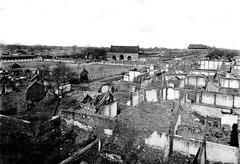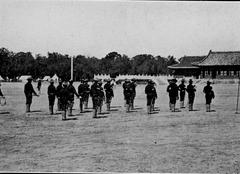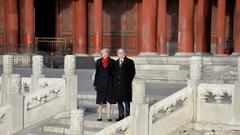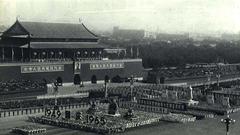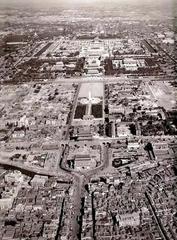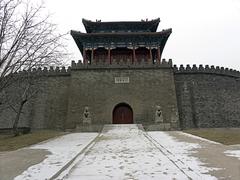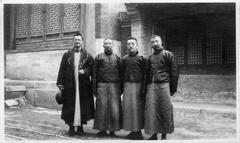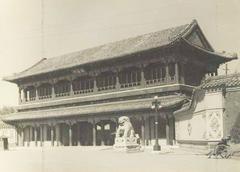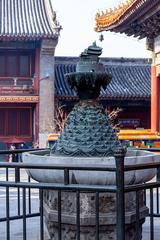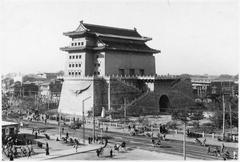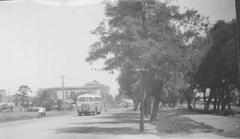Huguang Guild Hall Beijing: Visiting Hours, Tickets, and Historical Sites Guide
Date: 03/07/2025
Introduction
The Huguang Guild Hall (北京湖广会馆, Běijīng Húguǎng Huìguǎn) is a jewel of Beijing’s cultural and architectural heritage. Established in 1807 in the city’s Xicheng District, this landmark is celebrated for its elegant Qing Dynasty design, longstanding tradition as a hub for Peking Opera, and pivotal role in China’s modern history. Today, the site functions as both a living theater and a museum, drawing visitors eager to experience authentic performances, explore immersive exhibits, and admire stunning architecture. This guide offers comprehensive, up-to-date information on Huguang Guild Hall visiting hours, ticketing, transport, accessibility, cultural highlights, and essential travel tips.
Table of Contents
- Introduction
- Historical Significance
- Performing Arts and Cultural Legacy
- Visitor Information
- What to See and Experience
- Practical Visitor Tips
- Nearby Attractions and Itinerary Suggestions
- Frequently Asked Questions (FAQ)
- Visuals and Media Suggestions
- References and External Links
- Conclusion
Historical Significance
Regional and National Impact
Originally constructed as a gathering place for migrants from the Huguang region (modern Hubei and Hunan provinces), the Huguang Guild Hall became a vital social and economic support center. It provided a sense of community, facilitated business, and hosted cultural and social events for new arrivals in Beijing (China Daily; Visit Beijing).
The site’s national importance is underscored by its role in the founding of the Chinese Nationalist Party (Kuomintang) in 1912. The historic meeting led by Sun Yat-sen brought together revolutionary leaders and marked a turning point in modern Chinese politics (Wikipedia).
Architecture and Preservation
Covering approximately 4,700 square meters, the guild hall complex exemplifies Qing Dynasty architectural brilliance. The main theater, Wenchang Pavilion, Xiangxian Ancestral Hall, and the famous Ziwu Well are among its key features (Visit Beijing; foreignercn.com). Intricate timber frameworks, dougong brackets, upturned eaves, and vibrant color palettes of red, green, and gold characterize the site. Restoration efforts in the late 20th century have ensured the authenticity and longevity of these historic structures (Huguang Guild Hall Official; english.beijing.gov.cn).
Performing Arts and Cultural Legacy
Huguang Guild Hall is revered as one of Beijing’s “Four Great Theaters.” For over a century, it has staged Peking Opera and other traditional performances, hosting legendary artists like Mei Lanfang and Tan Xinpei (Huguang Guild Hall Opera). Today, the Beijing Traditional Opera Museum within the complex preserves opera heritage with costumes, props, and interactive exhibits (Beijing Government). Regular performances, festivals, and cultural activities make the guild hall a vibrant, living center of traditional Chinese theater.
Visitor Information
Location and Transportation
- Address: No. 3 Hufang Road, Xicheng District, Beijing (Deep China Travel)
- By Subway: Take Line 7 to Hufangqiao Station (Exit C). Walk about 300 meters to the entrance.
- By Bus: Routes 7, 14, 15, 23, 34, 66, 70, 102, 105, and 603 stop at South Hufangqiao Intersection. The hall is a short walk away.
- By Car: Parking is available nearby but fills up quickly on weekends/holidays.
Visiting Hours and Tickets
- Opening Hours: Daily, 09:00–22:00 (Deep China Travel)
- Performance Times: Most shows are scheduled from 18:30–19:30; schedules may vary—confirm in advance (Huguang Guild Hall Official)
- Ticket Prices:
- General Admission: 80–380 RMB, depending on seat location and performance type
- Private Boxes: Premium rates for exclusive seating
- Booking: Highly recommended to purchase online or in advance for popular events
Accessibility
- The guild hall is largely wheelchair accessible, with ramps and designated seating. Some historic areas may have steps or uneven surfaces; plan accordingly (english.beijing.gov.cn).
Guided Tours and Amenities
- Guided tours are available in Mandarin and English. Audio guides and informational brochures can be requested at the entrance.
- Restroom facilities and limited snack/beverage options are available onsite.
What to See and Experience
Architectural Highlights
- Grand Opera Theater: Semi-circular seating, elaborately carved wooden stage, and traditional tea service tables create an immersive cultural atmosphere (showbeijing.com).
- Wenchang Pavilion: Octagonal structure housing opera museum exhibits.
- Xiangxian Temple: Ancestral hall with commemorative tablets and the mysterious Ziwu Well.
- Baoshan Hall and Auxiliary Buildings: Spaces for exhibitions, meetings, and special events, retaining classic Qing-era elegance.
Opera Performances and Cultural Events
- Peking Opera: Authentic performances with English subtitles—an ideal introduction for international visitors.
- Modern Comedy: Shows by DeYunShe (Deyun Club) bring traditional crosstalk and humor into the mix.
- Special Events: Seasonal festivals, workshops, and themed activities enrich the visitor experience.
Museum Exhibits
- Beijing Traditional Opera Museum: Displays costumes, headdresses, musical instruments, archival photographs, and digital experiences that bring Peking Opera history to life (Beijing Government).
Practical Visitor Tips
- Performance Schedules: Not all performances are daily; check the official website or contact the box office before your visit.
- Advance Booking: Highly recommended for peak times and premium seats (Huguang Guild Hall Official).
- Arrive Early: Arrive at least 30 minutes before showtime to explore the site and secure your seat.
- Language: English subtitles are provided for Peking Opera; guided tours in English are available—check availability in advance.
- Dress and Etiquette: Dress comfortably. Maintain silence and turn devices to silent during performances.
- Photography: Allowed in most public areas; flash and tripods may be restricted during performances.
- Weather: Prepare for seasonal temperature changes, and bring water in summer.
- Payments: Mobile payments (WeChat Pay, Alipay) are widely accepted, but bring some cash for small vendors.
Nearby Attractions and Suggested Itinerary
- Liulichang Cultural Street: Antique shops, bookstores, and calligraphy studios—a must for culture lovers (Deep China Travel).
- Fuzhou New Guild Hall: Explore the legacy of Lin Zexu and the anti-opium movement (Visit Beijing).
- Jinghua Printing & Publishing Company: An architectural blend of Chinese and Western styles (Visit Beijing).
- “Birthplace of Peking Opera” Square: Landmark commemorating the city’s operatic heritage.
Frequently Asked Questions (FAQ)
Q: What are the Huguang Guild Hall visiting hours?
A: Open daily from 09:00 to 22:00. Last admission times may vary for performances.
Q: How do I buy tickets?
A: Purchase tickets on-site or online via the official website. Advance booking is recommended.
Q: Are performances held every day?
A: No, performance schedules vary. Check the latest timetable before your visit.
Q: Is the site wheelchair accessible?
A: Most areas are accessible, but some have steps or uneven surfaces. Plan ahead if you have mobility concerns.
Q: Are English subtitles available?
A: Yes, Peking Opera performances usually include English subtitles.
Visuals and Media Suggestions
- Exterior View: “Huguang Guild Hall historic buildings in Beijing”
- Theater Interior: “Huguang Guild Hall opera theater seating”
- Wood Carvings: “Intricate wood carvings at Huguang Guild Hall”
- Opera Costumes: “Beijing Opera costumes at Huguang Guild Hall museum”
Include alt text with keywords for SEO optimization. Explore online galleries and virtual tours on the official website for more visuals.
References and External Links
- China Daily
- Foreignercn
- Visit Beijing
- Huguang Guild Hall Official
- Beijing Municipal Government
- Wikipedia
- Deep China Travel
- Show Beijing
Conclusion
The Huguang Guild Hall stands as a testament to Beijing’s enduring legacy of cultural exchange, artistic innovation, and historical continuity. Its stunning Qing Dynasty architecture, legendary opera stage, and immersive museum exhibits provide an unparalleled window into the city’s past and present. Whether you are a history enthusiast, opera aficionado, or curious traveler, plan your visit to this living monument for an unforgettable encounter with Beijing’s rich heritage. For real-time updates, ticket information, and exclusive content, download the Audiala app and stay connected.
